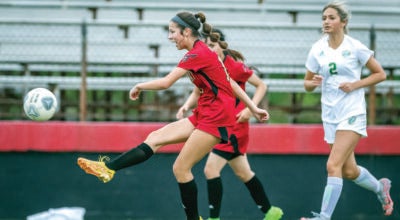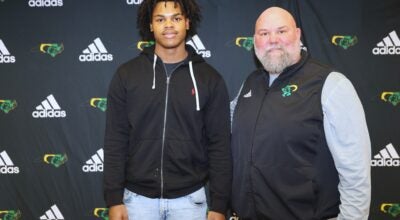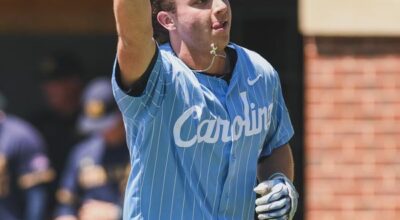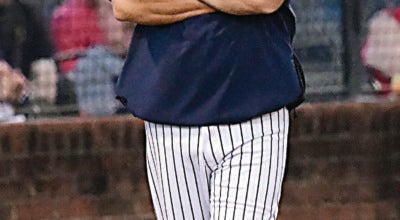Boltz reflects on '87 legion disqualification
Published 12:00 am Saturday, July 7, 2012
By Mike London
mlondon@salisburypost.com
SALISBURY — Brian Dean Boltz still goes out to Newman Park and still thinks it’s the most beautiful place in the world, but the sweet memories also come with a dose of pain.
Twenty-five years ago, Boltz, a lefty with serious heat and a knee-buckling curveball, was unhittable at Newman Park, Rowan County was on a roll, and fans were starting to think state championship as June turned into July.
But the imprint of Rowan’s 1987 squad on today’s record book is small. That Joe Ferebee-coached team, which also featured Eric Tyree, Warren Alexander, Chris Sifford, Mark Davis and Bobby Honeycutt (who hit 10 homers in just 20 games) finished 15-5.
They didn’t play a single playoff game. Rowan was disqualified in the waning days of the regular season. Its season had been over for weeks when Hamlet won the state title.
“Oh, yeah, Mark Davis and I still talk about it a lot,” Boltz said. “You know — what could have been, what might have been, how far could we have gone. I don’t know if we had the pitching depth to go all the way, but we’ll never know. It would have been fun to have had the chance to find out.”
Rowan was still battling for first place late in the regular season when players reported to Newman Park for batting practice prior to the scheduled game with Lexington.
“We got to the ballfield and Coach Ferebee called us over to the dugout,” Boltz remembers. “He said there had been a mess-up on some of the forms, and we wouldn’t be in the playoffs. Everyone just looked around with disbelief, and no one felt like doing much of anything for a while.”
Rowan’s new athletic officer Richard Lingafelt had filled out the forms for the first time that year. Rowan had submitted its pile of paperwork on time, but not all the forms had been signed by the respective players. Without signatures, forms were invalid. Area III commissioner Neal Davis of Concord said he was “sick as a dog” to do it, but it was his duty to disqualify the division’s strongest team.
Three years earlier, Concord had been DQ’d for turning in forms late. In 1980, Thomasville had suffered the same fate. Rowan had to be treated like everyone else.
Everyone felt bad for Lingafelt. There was no appeal, and Rowan, which had made the playoffs 21 consecutive seasons, bowed out.
“It was an honest mistake,” Boltz said. “Sometimes things just happen.”
The story might have ended there, except for one last performance by Boltz, a remarkable pitcher who is in the Catawba Hall of Fame.
The night Rowan players found out they had no future, they could have gone through the motions, but they didn’t.
“We decided we weren’t going out with our heads down,” Boltz said. “I was playing first base, but I told Coach Ferebee that if we ran into trouble, I could pitch some.”
Rowan trailed 2-0 in the fifth when Ferebee summoned Boltz to the mound.
He struck out 17 — yes, 17 — in relief and was still out there in the 12th when Rowan finally won 3-2 on Tyree’s sacrifice fly that plated Sifford.
While he usually pitched near 90, an angry Boltz threw some 93-mph heaters that night. That was his max, when he really wanted to let it go, and he knew it would be his last Legion outing.
“We all wanted to get our frustrations out,” Boltz said. “I could throw fairly hard, but my curveball was always my best pitch — my out pitch.”
That performance was not unique for Boltz that summer. His final numbers were 8-0 with 145 strikeouts in 72 innings — two per inning.
His ERA was 0.25, and the 17 Ks against Lexington were only his fourth-best total of the summer. He fanned 19, 21 and 24 hitters as a starter. In an abbreviated season, Boltz put up the fifth-highest season strikeout total in program history.
Boltz had experienced a down senior season at East Rowan in 1986, and despite being 6-foot-2 and a lefty, he was undrafted and lightly recruited coming out of high school.
He enrolled at Catawba, and as a freshman in the spring of 1987, he was 7-1 for the Indians with a 1.99 ERA.
On the heels of that fine effort, he was still eligible for Legion ball. That was rare for collegians in those days, but Boltz had an October birthday and was still a few months shy of turning 18 during his dominant Legion summer.
“That’s because Mom made sure she put me in school real early,” Boltz explained with a laugh.
Playing for coach Jim Dehart as a Catawba sophomore in 1988, Boltz was a first-team All-American, breaking school records for complete games (10) and strikeouts (147).
He was 23-7 in three years at Catawba and was drafted by the Atlanta Braves in the second round in 1989— the 57th overall pick. He pitched well for Durham in Class A ball after the draft and turned in a strong season in Double A for Greenville, S.C., in 1990.
But an offseason injury that was diagnosed as a slight rotator cuff tear was the beginning of the end. After surgery, he missed all of the 1991 and 1992 seasons, and his career ended after a comeback try in 1993.
“Just wear and tear caused the injury, and then the arm never responded after the surgery,” Boltz said quietly.
Boltz’ pro career like his final Legion season is a tale of what might have been.
“That summer of ’87 was definitely one of the greatest times of my life,” he said. “But looking back on the way it ended, it still hurts.”





